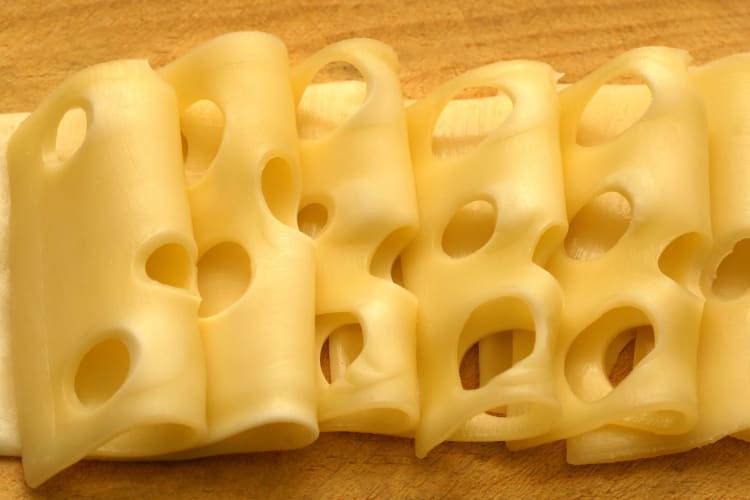Can You Freeze Cheese?

It’s hard to imagine a scenario where one could have too much cheese, but perhaps you got a little too excited to find your favorite cheese on sale, or you bought bags of shredded cheddar in bulk, hoping to feed a large family. For whatever reason, you’ve acquired more cheese than you know how to handle, but you don’t want to let it go to waste in your fridge.
Now you’re wondering, can you freeze cheese? What cheese can you not freeze, how will it affect texture and for how long can you freeze cheese? Here’s everything you need to know about storing cheese in the freezer so you can savor it for longer.
Jump to Section
- Why Freeze Cheese?
- Can Cheese Be Frozen?
- What Cheese Freezes Well?
- What Cheese Can You Not Freeze?
- How to Freeze Cheese
- How Long Can You Freeze Cheese?
Why Freeze Cheese?
After opening, most soft cheeses only last about a week in the fridge before they begin to spoil, although some hard cheeses can last 3-4 weeks in the fridge with proper storage. If you’re saving money on groceries by buying cheese in bulk, you can store it in the freezer to extend its lifespan. Freezing cheese may also be a good idea if you’re saving a nice, imported variety for a special occasion, a cooking class near you or an online cooking class.

Can Cheese Be Frozen?
Can you freeze cheese? The answer is yes! Many cheeses can be frozen without changing the flavor or sacrificing their quality. The key to freezing cheese is to get as tight a seal as possible and lock out any potential for freezer burn. If you frequently buy cheese in bulk, you may want to invest in a vacuum sealer. When cheese is frozen, the moisture inside turns to ice crystals, and everything tends to expand ever so slightly. When it thaws, the cheese shrinks again, and water droplets may be pushed to the outside, leaving a “loosened” structure behind.
Freezing cheese is a good way to store it, but it can make the cheese less versatile. Because freezing stretches out the protein structures, cheese can be more crumbly after thawing. For this reason, it’s best to use any previously frozen cheese in recipes where the texture won’t be noticeable, such as shredding on top of lasagna, melting into queso or slicing onto a hot burger patty.
“Can you freeze cheese?” doesn’t always have a yes or no answer. Due to the physical changes caused by the freezing process, some cheese will freeze better than others, so it’s important to consider the type of cheese you’re freezing and how you plan to use it later. Semi-hard cheeses like cheddar, provolone or Colby-Jack can usually survive this process without much noticeable difference in texture, but soft varieties like ricotta and very hard varieties like Parmesan won’t do so well. Cheeses with intentional live bacteria or mold, such as blue cheeses, also shouldn’t be frozen because freezing will harm the live microbes and alter the flavor.

What Cheese Freezes Well?
These cheeses will usually survive the freezing and thawing process without much noticeable change in texture or flavor:
- Cheddar
- Pepper jack
- Monterey Jack
- Colby-Jack
- Provolone
- Gruyère
- Gouda
- Asiago
- Havarti
- Shredded mozzarella
- Shredded or sliced Swiss cheese
- Goat cheese
- Oaxaca cheese

What Cheese Can You Not Freeze?
Nearly any cheese can be frozen, but not every cheese should be frozen. The quality of these cheeses may suffer considerably if frozen:
- Cottage cheese
- Cream cheese
- Ricotta
- Brie
- Blue cheeses
- Parmesan
- Romano
- Queso fresco
- Delicate, rare and hand-crafted cheeses
- Processed cheese (American singles, Velveeta, spray cheese, etc.)

How to Freeze Cheese
Block Cheese
Can you freeze cheese in blocks? Yes, you can freeze block cheese, but sliced or shredded cheese is much easier. If the cheese isn’t already packaged, wrap the block tightly in plastic wrap before freezing. For an extra layer of frost protection, place the wrapped cheese block inside a zipper-sealed plastic bag.
Some block cheese and cheese wheels should be frozen very slowly to avoid expansion and texture damage. The best way to do this is to cut the cheese into smaller pieces, roughly one pound in weight and no more than an inch thick. Tightly wrap the pieces, then place them in the freezer for 20 minutes at a time, letting them thaw for about five minutes in between freezings. Repeat until frozen.
To use frozen block cheese, allow it to thaw in the refrigerator for several hours or overnight. Frozen block cheese can be sliced, shredded or melted, but isn’t ideal for charcuterie boards or cheese trays due to its crumbly texture.

Sliced Cheese
Can cheese be frozen in pre-cut slices? Yes, the process for freezing sliced cheese is very similar to block cheese. Place a sheet of parchment paper between each slice to prevent them from freezing together, then wrap the slices tightly in plastic wrap. Place the wrapped slices in a zipper-sealed plastic bag and put them in the freezer.
To thaw your frozen sliced cheese, remove it from the freezer and place it in the fridge for a few hours. Once thawed, sliced cheese can be melted into a recipe or used to create burgers, grilled cheese and other sandwiches.

Shredded Cheese
Can you freeze cheese that’s pre-shredded? Yes! In fact, shredded cheese is the easiest cheese to freeze because it doesn’t need to keep a firm, solid texture, and the individual pieces freeze quickly. To freeze shredded cheese, leave it in its original unopened container or portion the cheese into smaller, zipper-sealed bags. Push out as much air as possible before sealing and pop into the freezer.

How Long Can You Freeze Cheese?
Freezing cheese is a great way to keep it from spoiling before you can use it, but unfortunately, it won’t keep indefinitely. Even in the freezer, cheese can still go bad. Can you freeze cheese for weeks or months at a time? In most cases, yes, semi-hard cheeses like cheddar and Colby-Jack will last in the freezer for anywhere between six weeks to nine months. Of course, the sooner you can use your frozen cheese, the better it will be.
Can cheese be frozen twice? Once you’ve frozen and thawed your cheese once, it’s not such a good idea to freeze it again. Refreezing your cheese won’t take away nutritional value or make it unsafe, but you’re more likely to ruin the texture and alter the flavor if you freeze cheese multiple times.

To conclude, “can you freeze cheese?” is a good question, but a better one might be “should you freeze your cheese?” If you understand that frozen cheese may become crumbly once thawed, then freezing your cheese is a great way to help it last longer and avoid wasting food. By keeping frozen cheese on hand, you’ll always have what you need to make cheesy soups, sauces, casseroles and more!
For even more ways to explore your favorite foods, check out other experiences happening on Cozymeal.
